#particularly a news article written in German
Explore tagged Tumblr posts
Text
It is an interesting choice to use painter's tape, especially because painter's tape is traditionally used to protect something when you're painting.
But maybe that's the point. Plenty of people are attempting to brush over this moment and "paint" it with a different brush. Spin it another way.
Putting painter's tape on it is meant to preserve it -- a refusal to let the other side paint over this moment.

^what he said
#elon musk#anybody with half a brain who sees this gesture should be appalled.#and I'm sure there's possible legal and or ethical reasons they cannot or will not display this gesture in a news article#particularly a news article written in German#but holy fuck are they sending a message in how they've chosen to cover it up
63K notes
·
View notes
Text
Cataloguing my top ten Cherik fics in order of popularity, in case anyone fancies some new reading material 😉
https://archiveofourown.org/users/FuryRed/works

Five Nights in Nuremberg
When Charles escapes from the mutant prison he has been held in for the last two years he knows that he’s going to need help to avoid being recaptured.
What he doesn’t expect is that help will come in the form of a mysterious German man who rescues Charles and takes him to his home; a handsome stranger who, frustratingly, doesn’t speak a single word of English…
Bound
Is there anything worse than someone else’s wedding? Well, perhaps your sister’s wedding- where the groom just has to invite his boss and that man just happens to be your ex-boyfriend; a person you had an extremely passionate and tumultuous relationship with that ended badly.
Charles hadn’t seen Erik for a year by the time Raven had told him about the wedding. He wasn’t looking forward to the occasion, particularly when Raven explained that they would be celebrating the event with a two-week extravaganza at a luxury hotel, meaning that Charles would be forced to spend a whole fortnight with the man who he’d given everything to; the man who had ultimately broken his heart…
Can You Feel My Heart
Erik Lehnsherr hates Charles Xavier.
It’s as true as the words written on the wall in the bathroom at the university that Erik attends. Erik sees them one day- accompanied by a crude drawing of Erik and Charles glaring at each other- and recognises the truth of the sentence, and smiles.
He hates Charles.
Probably…
The Best You Never Had
By the time Erik is in his late twenties he has grown tired of his mother meddling in his love life- always setting him up on numerous dates with various suitors.
But then Erik’s mother offers to set him up with someone he used to know- the gorgeous blue-eyed boy Erik had a crush on in school, the boy Erik desperately wishes he had been nicer to.
How Erik ends up entering into a fake relationship with the man in order to keep his mother happy is anyone’s guess…
Forgotten
Charles is having a really bad day. Not only has he woken up in the middle of the afternoon with no idea where he is or how he got there, but when he returns home he’s confronted by a stranger with intense eyes, who insists that he knows Charles rather more intimately than Charles remembers…
In Service of the King
Co-authored by the wonderful @pinkoptics
The people of Britannia have been saved from an unbearable fate at the hands of Emperor Shaw. In order to express their immense gratitude, they offer the ultimate tribute- Charles Xavier, the beloved son of their leader.
Far from naive, and even before agreeing to be made a gift, Charles is only too aware of what such an arrangement will entail- a life spent on his knees for more reasons than one... But upon arriving on Genosha’s shores, it soon becomes clear that sexual submission may not be all that is desired of Charles, and that King Erik may have some notions of how he wishes to be serviced that are not at all what Charles expected...
Power and Control
Charles had done a number of stupid things in his lifetime, but this was probably the worst.
Deciding to piss off the leader of The Brotherhood of Mutants was a recipe for disaster, particularly when said leader had a reputation for swift and bloody vengeance. But, as it turned out, being murdered wasn’t what Charles would need to worry about. Apparently there’s a great many things you can do to exert your power over someone, rather than simply killing them…
Enemies With Benefits
Charles Xavier and Erik Lehnsherr are the leaders of two opposing mutant factions; their rivalry played out over televised debates and in the articles of tabloid newspapers.
The tension between them is so palpable that, naturally, everyone assumes they're fucking- which they are, not that Erik is particularly happy about it... But he is content to console himself with the idea that it's just sex and nothing else, and that he is in no way interested in the spoilt little rich boy he can't seem to stay away from.
But then an attempt is made on both their lives and they are relocated to a safe house- a secluded cabin in the middle of the woods. At first Erik hates being forced into such close quarters with Charles, but gradually he begins to realise that 'hate' might not be the emotion driving him after all...
I Know
Charles had always considered himself quite a moral person, so he was as surprised as anyone to one day find himself with his mother’s boyfriend between his legs…
The Right King of Wrong
When Erik accepts a job working as a mechanic for the Xavier family he thinks it will be the solution to all his problems; a way for him to get inside the Xavier mansion without raising suspicion, so he can find out more about the labs rumoured to be hidden in the basement- a location where numerous mutant experiments are said to have taken place.
The mission is only supposed to take a few weeks, but then Erik meets Charles- the nineteen-year-old heir to the Xavier family fortune, who is back from Oxford University for the summer. Rather suddenly all of Erik’s carefully made plans fall spectacularly to pieces as the two of them embark on a love affair that has the potential to alter both of their futures, and their lives, forever…
195 notes
·
View notes
Text
When it is asserted in Germany that in vitro fertilization and similar technologies are all about helping infertile women, German feminists impatiently brush that claim aside. They are irritated at any suggestion that they ought to take such a claim seriously. It is, they say, a "Deckmantel," which means "cloak," "disguise." In conversations with them, one hears occasional references to the political naivete of Americans who accept such a "Deckmantel" at face value.
German feminists have known all along that the stakes in this issue are high. They are particularly sensitive to the ways in which these technologies can and are beginning to be used to manufacture human beings to specifications and, in the process, to reduce women to breeders or, less elegantly, to raw material for a new manufacturing process.
Unlike U.S. feminists, they organized as a movement on the issue and began spreading their critique beyond the feminist movement.
That the stakes are indeed high became dramatically evident in December 1987.
The German equivalent of the FBI (the 'Bundeskriminalamt") staged thirty-three simultaneous raids, many of them against feminists, throughout the Federal Republic of Germany, December 18 at 4:30 p.m. A total of 430 heavily armed police burst into the workplaces of activists. Fifteen to thirty in a group, the police swept into homes in Cologne, Dortmund, and Düsseldorf. In Essen, Duisburg, Bochum, and Hamburg, the raids were directed overwhelmingly against feminist critics of genetic and reproductive technology, according to Prozessgruppe Hamburg, a watchdog group.
The targeted critics have written and spoken on such issues as in vitro fertilization, amniocentesis, sex predetermination, and genetic engineering. They have actively opposed surrogate motherhood. Many worked together in a massive coalition to stop Noel Keane's attempt to open a branch of his U.S. surrogate business, United Family International, in Frankfurt. (Keane's New York firm arranged the Mary Beth Whitehead surrogate contract.) Their campaign to stop the sale of U.S. women to European men for breeding purposes ended successfully January 6, 1988 when a West German court ordered Keane's business closed, three months after it had opened.
Grounds for the police raids? In many cases, the women were not given any. But the next day, newspapers reported that the police conducted the searches to ascertain whether any of the individuals were members of a terrorist organization. They were specifically looking for a group called Revolutionaren Zellen and its feminist wing, Rota Zora.
The police were operating under Paragraph 129a of the terrorist act, "Support or Membership in a Terrorist Organization."
The women raided were forced to undress. All "non-changeable marks" on their bodies—scars, moles, etc. —were noted down in police records. The women were fingerprinted.
Two well-known and widely respected women were arrested: Ulla Penselin, active in two groups in Hamburg, Women Against Genetic Engineering and another group critiquing population control policies; and Ingrid Strobl, a journalist for eight years with the national feminist magazine, Emma. Strobl is accused of buying a clock used in a bombing attack against Lufthansa offices in Cologne to protest the exploitation of Third World women in the sex-tourism industry. Both women were charged under the terrorist act, Paragraph 129a. Strobl remains in prison while Penselin has since been released.
In the nationwide raids, police confiscated materials from an archive on genetic and reproductive technology established by women in Essen and from private homes and apartments. They seized drafts of the women's speeches, material prepared for seminars, names and addresses of those attending seminars, published work, videos, tapes of radio programs, scientific articles, postcards, brochures and private address books.
The police raids appear to be an attempt to stop the widespread antigenetic technology movement in Germany by linking legal organizations with more militant ones, Maria Mies, author of Patriarchy and Accumulation on a World Scale and professor of sociology at the Fachhochschule in Cologne, told me in a telephone interview from her home.
"No concrete accusation or crime was being investigated," she pointed out. "This means that women doing 'Aufklarungsarbeit,' that is, researching reproductive or genetic engineering or talking about it or giving seminars, are already doing enough to provide a pretext for the attorney general to launch such a police action."
Mies, an organizer of the world's first massive feminist conference against reproductive and genetic technology in Bonn in 1985, said of the police action: "We think it is an effort to criminalize and intimidate the whole protest movement of women against reproductive and genetic engineering and frighten others away from participating in order to prevent the movement from spreading even more widely."
Mies added: "We are planning another conference against reproductive and genetic engineering just to demonstrate that we are continuing our work."
-Gena Corea, “The New Reproductive Technologies” in The Sexual Liberals and the Attack on Feminism
#gena corea#reproductive technologies#German feminism#female oppression#womens history#patriarchal state#anti ivf
122 notes
·
View notes
Note
OOH do you have any old motogp forum recs?? I would love to see what fans were saying in like the early 2000s, but I have no idea where to look
lemme check my bookmarks... r1-forum I've gone through a fair bit, threads dating back to early 2004. motogpforum goes back to early 2005. motorsportsforum picks up late 2006-ish, that one I've gone through in its entirety for the early alien era. motorradonline24 is admittedly in german but has the BIG selling point that it goes all the way back to 2001. apriliaforum also goes pretty far back but it takes a little longer for discussion of actual racing to get going. there's definitely more I've checked out - I might make a proper list at some point, but just to start you off
the thing about these forums is that it's undoubtedly interesting and useful to get some context of fan opinions (good mix of actual nuance/worthwhile discussion and just slagging off a bunch of riders)... but if anything they're even more precious as a record of actual *news* that has otherwise been scrubbed from the internet. there's a lot of drama and controversies and anecdotes that only exist on these forums
which... tbh there's been quite a few that I haven't included in my posts just because I'm not entirely sure they quite pass the burden of proof requirements. but man, so many of them are so interesting. it's a tricky balance. just as an example - one particularly nasty thing casey allegedly said about jorge that IF TRUE does feel like it would add something to my understanding of casey. but the article only exists on forum pages... still, it made it to three different forums I can find and is written in the usual tone of the author, so I feel fairly confident the original article existed. but then again, the article itself is just an anecdotal conversation relayed by one bloke. on the other hand, this is a reputable enough commentator you wouldn't expect to COMPLETELY make it up - and funnily enough I have even found a photo of him talking to casey that specific weekend. on the other other hand, it's a colourful anecdote that might have been exaggerated for effect. then again, I can kinda see casey saying it - not least because casey confirmed in his autobiography years later that he was pissed off at jorge that specific weekend. but it does feel like the sort of thing that should have caused a controversy... like if jorge saw what casey allegedly said you'd expect there to be nuclear winter, and there's no further trace of it. hm
so what do you do with that kind of thing, share it or not? the further you go back with this stuff the worse it gets, where I keep finding - plus am being sent - increasingly wild quotes from early noughties motogp. at least most of those are from news sites, some of them of dubious quality, but generally you'd really like to find at least one other source backing up the quotes. which often you won't get!! so yeah, it's all interesting context and gossip, but as ever I'd advise being wary of the specific stories. even the funny ones. especially the funny one
anyway, all that being said. this ask was sent in relation to a post about laguna 2008, so I'm going to take this excuse to actually share some discussion of laguna 2008
so. taking u through the fan chat of the weekend from one specific forum with select commentary... here's the thread starter

reminder that dani was injured at the sachsenring and would eventually opt against racing (effectively ending his title bid, but michelin was useless anyway that weekend)

relatively good reason to believe in english-speaker (and in particular american) overperformance at the track. obviously hayden won there the first two years, edwards even beat valentino to second in 2005 which has got to be the only time that year he finished ahead of vale. often more familiar with the track, or it just suits their riding style better. and ofc vermeulen did bag a distant third. still. valentino in the trenches if people thing edwards will beat him icl
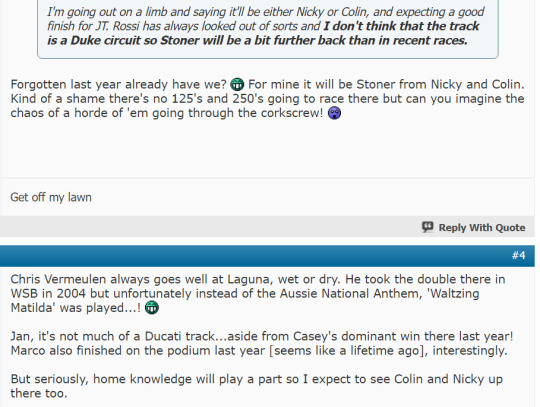
have to say. the idea of the 125/250 riders going down that corkscrew fills me with a visceral sense of horror

'marco' btw as in marco melandri, in the middle of his ducati season from hell
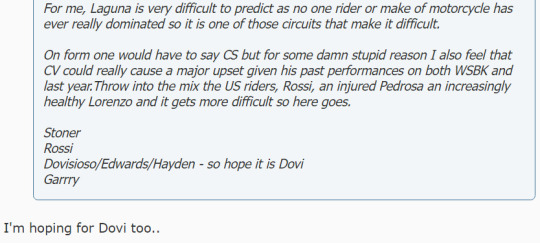
dovi super popular in 2008 fyi, darling of the posters. everyone was obsessed with his rookie season
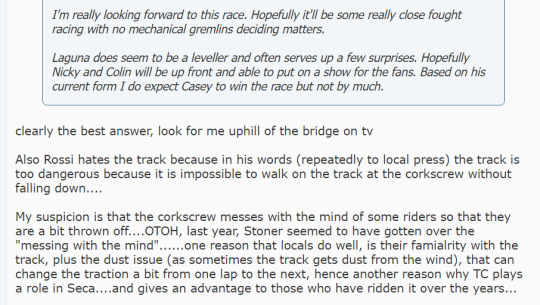
plenty of solid foreshadowing happening here you have to say

it is very motogp rider behaviour, and also very valentino behaviour, to look at the corkscrew, go 'hm i don't think this is even safe to WALK down', and then fucking hurl yourself at the other guy into that very same corner as you're both travelling at horrifying speeds on a motorcycle. going tentatively through that bit of the track during practise and then in the race he's making his bike go bounce bounce like a trampoline

wow!

*stares at camera*

still nasty work to say this, he repeated it in several interviews I think
okay, no forum posts during the race itself so now we skip to the post-race discussion

which is what the tone from a lot of posters was like
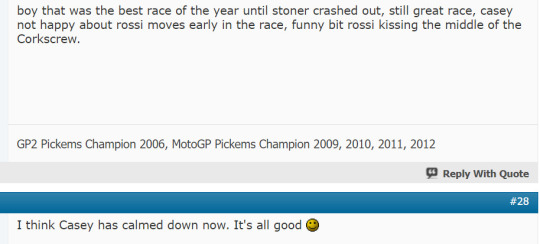
narrator: casey had not calmed down
(if you watch the podium ceremony and see some of the photos without context, you WOULD think they're having a laff. it's just that they're having a laff while casey is telling valentino that he's lost respect for him and valentino is delighted)

two australians on the podium btw

jorge highside cameo

a lot of people were whinging about a lot of 800cc races being boring because a lot of them were. you can copy and paste much of what people are saying about racing these days, if you want to get an idea of the tone

casey fan writes in

again. cannot be stressed enough how casey very much had not calmed down. but that's the fun thing about that rivalry, like they will ALWAYS have a tonal mismatch between their face-to-face interactions and whatever out of pocket things are being said in the press. casey also really big on the pissed off smile which helps
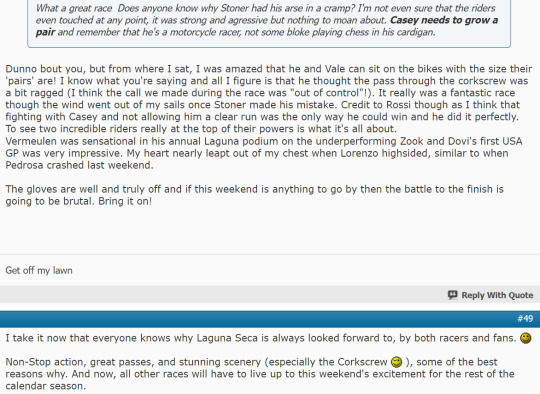
'not even sure that the riders even touched at any point' is. pushing it

yeah the no handshake thing really didn't get a positive response (casey did ofc eventually shake valentino's hand on the podium)

is it really a clean battle if you think someone will fall off

don't want to say that it's a lost cause because casey DID get smarter about this stuff, but ducati certainly aren't doing shit
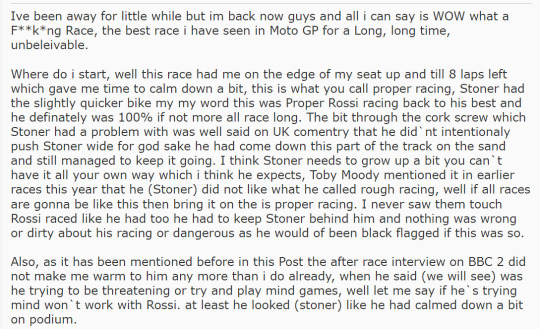
so much of laguna and its legacy is about both of them threatening each other lol, please allow him


again, podium chat categorically not a friendly conversation. otherwise qualified casey defence

likewise

thought this was interesting in terms of discussion of actual rules - valentino said a few years ago the move wouldn't be allowed anymore and he thinks that's a good thing
“It needs rules,” he said. .”Because the situation with the overtaking manoeuvers and everything is much more extreme now than it was in Laguna Seca in 2008. The routes have changed a lot, now there is no more grass next to the slope, but the green stripe. “That was done for safety. Because if you catch the grass at that speed, you'll fly away. The asphalt, on the other hand, is less dangerous. In my opinion, however, you have to make a rule and say that you shouldn't touch the green at all - see it as if there were still grass there. “At the level we have reached today, which is extreme in many respects, everyone goes over the curbs and is all green if you don't have a clear rule. I think that's the right thing to do.”
but yeah tbh... I know casey disagrees but I feel like the move WAS probably fine by standards of back then

some more rules chat

and more

"will be hearing big footsteps every time he is in front"

and here we are then. not much that's groundbreaking, but I do find it interesting!! this is a pretty pro-casey audience... most of these forums were generally pretty positive about him. english language speakers were way more hostile towards dani and later jorge for various reasons - you'll also find at least some distaste for valentino in these spaces alongside the usual adulation. so that's the yardstick... this is probably close to as casey-friendly as discussion of the race got among the wider fanbase. it was always going to be a tough sell to air his grievances about this race until a few years had passed. the general reaction was that the racing had been hard but fine, an extremely welcome contrast to the general quality of racing at the time. and almost nobody thought casey should have reacted as he did in parc fermé. interesting contrast with jerez 2005 actually (though admittedly sete not particularly popular in most forums) - sete was low key seen as having a more legitimate grievance than casey. anyway, obviously this blog's stance is that sportsmanship is overrated, but that's how you end up getting the poor bloke apologising in brno
#i did recently find an actual clip of an actual interview valentino did qatar 2004 that i could verify with my very own eyes#which was very exciting. but that kind of thing is winning the lottery of motogp archival research. just won't happen every day#//#brr brr#batsplat responds#//ht#the rider for whomst fan perceptions have done a most radical 180 is definitely dani. pretty widely hated back in the day#admittedly that'll be exaggerated in english forum threads - presumably lots of americans there who obviously loathed him#is quite funny seeing casey write about the us fans' pure love for racing like buddy u do know they're just booing someone else right??
7 notes
·
View notes
Text
Herodotus and Protestant Humanism
“Abstract : During the sixteenth century Herodotus’ Histories reached new audiences throughout Europe, in Greek, Latin, and the vernaculars. This period saw the emergence of an extensive scholarly literature on Herodotus, particularly in German-speaking lands, where Lutheran reformers and academics worked concertedly to incorporate Greek historiography into the new didactic curriculum of Protestant humanism. This article explores Herodotus’ reception in the context of the religious and cultural upheavals of the Reformation, and examines the origins and impact of some striking claims: that Herodotus’ religious beliefs were largely commensurable with Christianity; that his Histories were part of a divine plan to create a continuous record of world history; and that his was an excellent text with which to illustrate the Biblical Ten Commandments. In tracing a little-known chapter in the Christianisation of Herodotus, I focus on the close-knit circle of Hellenists trained by the Lutheran reformer Philipp Melanchthon and on the prodigious Francophone scholars Henri Estienne and Isaac Casaubon.”
“Conclusions
Taken as a whole the lectures, histories, advertisements, commentaries, and marginalia analysed in this article show that, during the sixteenth century, many readers engaged closely with Herodotus’ ethical and theological content both on a personal and emotional level and on the level of rhetoric and pedagogy.
It is worth stressing that the differences between the approaches of Estienne and the Lutheran reformers are not the result of ignorance of one another’s Herodotean endeavours, for these Protestant humanists read one another’s works voraciously. Estienne had dedicated his edition of Pindar (1560) to Melanchthon, and in the dedicatory epistle Estienne basks in the reformer’s ‘paternal benevolence’ towards him. Estienne’s editions of Thucydides (1564) and Herodotus (1566) were dedicated to Joachim Camerarius and his Greek edition of Herodotus (1570) reprinted Camerarius’ Proœmium to Herodotus. In 1564 (in a dedication to Théodore Beza) Estienne described Camerarius and Melanchthon (who had died in 1560) as the ‘twin luminaries of Germany in our age’, and, in 1588, he printed an extract from Chytraeus’ Chronologia historiae Thucydidis in his second edition of Thucydides.144 Given that Melanchthon and Estienne were correspondents there is no reason to suppose that Estienne’s familiarity with the works of the Lutheran reformers was one-sided—and indeed Camerarius dedicated his 1565 translation and commentary on selections of Thucydides to Estienne.
Yet, despite a close knowledge of one another’s works, the interests and goals of these scholars differed greatly. The requirements of Melanchthonian historiography caused Lutheran humanists to simplify Herodotean narratives to fit a model of exemplary history reminiscent of that favoured by ancient authors like Plutarch (who far outstripped Herodotus in popularity in the sixteenth century).145 It is,moreover, striking that Camerarius’ defence of Herodotus in his Proœmium (1541) argues openly (against Plutarch) that the Histories was written according to the principles of exemplarity, while Melanchthon and his pupils write as if this point had never been in dispute. Estienne’s reading of Herodotus’ theology in the Apologia represents the first in along line of works which would claim that Herodotus subscribed to a proto-Christian theology—a coherent belief in a just, all-powerful, providential divinity whose will was fate. Despite being the first substantial stone thrown in a debate that would last over three hundred years, the Apologia remains one of the most thorough and sophisticated examples, unsurpassed in several respects until the 20th century.146
The attempt of the Wittenberg theologians to read Herodotus’ Histories in moral and exemplary terms has proved yet more enduring. Much scholarship on Herodotus written in the last century attempts, like Herodotus’ Renaissance readers, to divide the characters of the Histories into positive and negative exemplars which are rewarded or punished by the gods according to their merits and deserts.147 Scholars who propose one or another structuralist dichotomy as the hermeneutic key to the Histories place themselves under similar interpretative pressures to those experienced by Melanchthon and his successors, and they have inherited or independently alighted on many of the same tactics in order to deal with the textual difficulties.
But, as we have seen, Herodotus’ text does not give the dogmatist an easy time. In a work as large and generically diverse as the Histories, such an approach necessarily involves drastic simplification—it denies the possibility of ‘tragic’elements in the Histories, of characters who suffer arbitrarily, senselessly, or disproportionately, or of more troubling notions like divine hostility towards humanity. By watching Herodotus’ early modern commentators attempt familiar exercises—like dismissing Herodotean complexities to present Croesus and Xerxes as wholly negative exemplars of bad kingship ‘justly punished’ for their expansionist mania—we gain a fresh perspective on the preoccupations, assumptions, and techniques of much more recent literary criticism.
The study of the rhetorical and didactic treatment of Herodotus in the Renaissance is, then, an exercise in hermeneutics as well as a significant chapter in the afterlife of the pater historiae. Observing Renaissance scholars appropriating Herodotus’ text should encourage us to look more critically at the assumptions that underlie the way we, Herodotus’ latest readers, approach the vast and complex work that stands at the beginning of the tradition of European historiography.”
Anthony Ellis “Herodotus Magister Vitae. Or: Herodotus and God in the Protestant Reformation” in B. A. Ellis (ed.) 2015. God in History: Reading and Rewriting Herodotean Theology from Plutarch to the Renaissance (Histos Supplementary Volume 4: Newcastle on Tyne)
On line source with the whole text https://www.academia.edu/20228320/Herodotus_Magister_Vitae_Or_Herodotus_and_God_in_the_Protestant_Reformation
4 notes
·
View notes
Text
Went looking and this particular tweet seems to have been deleted now (or perhaps I just can't find it) as of 2:15pm EST, January 14. However, the related thread does lend credibility toward this being real, as the phrase “axis of evil” is also used here (screenshot below, for posterity, with description in ALT text)

(The “him” being spoken to here is U.S.-American Secretary of State Antony Blinken, while the “you” in “your war” presumably refers to the United States.)
Earlier on in the same thread, the Prime Minister makes four separate comparisons between Hamas and the Nazi regime, the first two being here and here. (Screenshots attached below with descriptions in ALT text.)


(The German news article/video clip cited by reader context in that screenshot can be found here, or you can click the big version below. The clip was posted October 17th, according to the timestamp on the website, and the headline does seem to indicate that Prime Minister Netanyahu was the one to say this, but I can't seem to find subtitles or a transcript, only a small blurb containing a general video description. I also can't speak to how credible of a news source this is, since I don't personally speak German and so I am unfamiliar with their news sources.)
(For anyone who does not recognise the title, or only vaguely remembers it, Mein Kampf is the title of the Nazi manifesto written by Adolf Hitler. Therefore, the specific claim that Prime Minister Netanyahu is currently making is that Israeli forces have found copies of the Nazi manifesto in Gaza. He is using this claim as evidence in his favor.)
In another appeal to the wider global audience, Netanyahu makes a third comparison between Hamas and Nazi Germany, found here, interestingly choosing to emphasise Hamas as baby killers, despite the fact that Israeli forces burn, bury, and brutalise Palestinian children with extreme prejudice every day. (There is also something to be said about the population statistics, and how the numbers quietly present the fact that children and young adults are almost the only people left to fight for themselves, after so many years of purposeful, violent population suppression and inhumane treatment on the part of the Israeli government.)

And, in the fourth incident, here, the Prime Minister also refers to Hamas as monsters, which is noteworthy given the history of Palestinian dehumanisation at the hands of Israel, particularly the recent language referring to Palestinians as inhuman or sub-human animals. (Screenshot with description in ALT text below.)

Regardless of one's personal feelings about Hamas as an organisation, whether they are in the right or the wrong, this sentiment is of particular significance because Israeli forces have shown spectacular disregard for civilians in their hunt for Hamas. This mindset— thinking of their opposition as monsters instead of people— will only lead to more casualties, especially among civilians.
Finally, coming back to the original post: I still can't find the tweet in the original screenshot, but there are also four others from the thread which express similar sentiments. Here we have Netanyahu specifically expressing outrage and hostility toward the Hague.

(Presumably referring to South Africa's official claim against Israel on crimes of genocide, marking the start of a legal investigation & case.)
Here, here, and here, we have Netanyahu reasserting Israel's staunch refusal to compromise or stop the violence.



So, I guess that concludes my fact-checking at about 4:35pm EST. Hope this helps someone!

Things you say when you’re totally not guilty of what you’re accused of
#palestine#israel#i don't actually have tags for this stuff so idk what to tag as#current events#free palestine#mine#(just to keep track of it since it's an addition i wrote. btw sorry op & anyone trying to read the notes)
5K notes
·
View notes
Text

Shootings And Violence: Impulse Influence Induced?
Impulse (or trigger) influence is characterized by a short-term effect that ends immediately after the trigger transmission ceases. However, it has a rather strong psychogenic impact on the recipients of the information. Such impulse impact is capable of provoking a person to commit antisocial actions that are uncontrolled or poorly controlled by consciousness, including provoking a crime, and even a series of copycat crimes, which are typically aggressive in nature.
This occurs in the presence of additional conditions in the external environment and a certain psycho-emotional state of the subject.
In criminology, triggers are isolated and studied in much the same way as the triggers that provoke suicide epidemic.
Media manipulation of teenagers’ minds was described as early as the 1970s by sociologist David Phillips. He described the Werther syndrome, a pattern of imitative cluster suicides following the well-publicized suicide or one described in a popular work of literature or cinema.
This syndrome is named after the main character who ended his life by suicide in the famous novel The Sorrows of Young Werther. This book was written by the 18th century German playwright Johann Wolfgang von Goethe.
After its release, the novel became famous and spawned a wave of suicides among young people.
Psychologist Benedikt Till from the Medical University of Vienna, who specializes in studying this phenomenon, explains it as follows: The Werther effect describes the phenomenon when the number of suicides rises sharply if mass media pay a lot of attention to a suicide and sensationalize it.
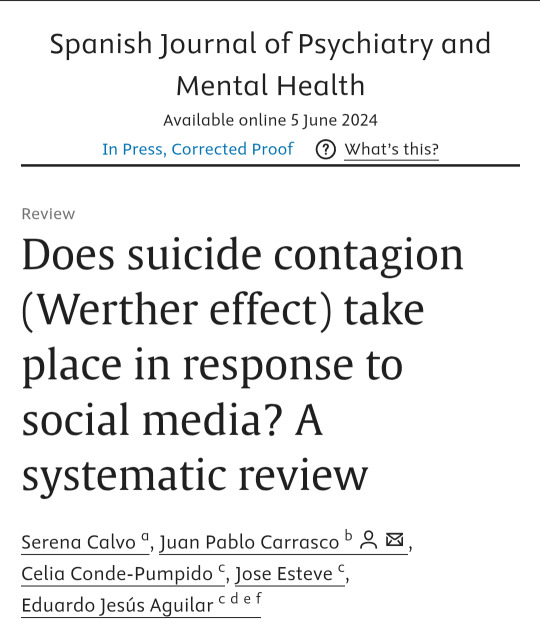

If the suicide is described in detail or if the motives of the suicidal person become the subject of public discussion, especially such motives as unrequited love, betrayal of friends, money problems and so on, the effect is particularly strong because the reader identifies with the suicidal person, i.e. is impressed by their image, starts thinking about this all the time and unconsciously projects the possibility of such a suicide onto himself, replaying the suicidal scenario in his head.
Research in the field of criminal justice contains many papers assessing the scale and mechanisms of ‘copycat crime’.
These are crimes whose methods and techniques copy the crimes that the criminals learned about in the media. Let us return to the topic of school shootings and mass shootings. Сan it be that hidden glorification of shooters in the media along with the detailed description, narration and video demonstration of their actions contribute to future mass shootings? The German research Institute of Labor Economics IZA reports that in the U.S., news coverage of a mass shooting causes approximately three mass shootings in the following week. There is a lot to think about.
It is also noteworthy that almost all of the above studies are aimed at studying aggression and violence in the media as affecting human mental health and behavior. However, it is difficult to find studies on the forms in which violence is presented on TV and in the media, and what specific viewpoints and attitudes are shaped in individuals when encountering information about violent situations.
In recent years, new technologies of influence on mass consciousness have become extremely widespread. These are developments from the sphere of psycholinguistics, neuro-linguistic programming, cognitive priming, suggestive linguistics and other highly effective techniques of influence that affect not only consciousness, but also subconscious perception of a person.
The set of influence techniques is diverse, but all of them are based on the psychology of perception. The use of such new manipulation technologies can be found today in the media, as revealed in “The IMPACT” documentary.
Read more about this in the article:
School Shootings And Manipulation Over Consciousness
How to Protect Children and Identify Dangerous Media Content?
#RACIRS #children #parents #cult #anticultism #psychologist #sociologists #criminologist #law #freedom #humanRights
#united healthcare#reddit#manipulation#gun violence#school shooters#mass media#anticultism#media manipulation
0 notes
Text
Internship and Job Opportunities for Students in Germany

Germany, renowned for its robust economy and high-quality education system, stands as a beacon for students seeking not only academic excellence but also rich internship and job opportunities. For many international students, Germany's appeal lies in its unique combination of practical work experience and theoretical learning. This article delves deep into the myriad of opportunities available, offering insights on how to navigate the German job market effectively.
Why Choose Germany for Internships and Jobs?
Germany is not just the land of poets and thinkers; it is also a hub for innovative industries and cutting-edge technology. The country boasts a strong economy, with numerous multinational corporations and thriving small and medium-sized enterprises (SMEs). For students, this means an abundance of opportunities across various sectors such as engineering, IT, finance, healthcare, and more.
Benefits of Working in Germany
High Standards of Living: Germany offers an excellent quality of life with a balanced work-life culture.
Competitive Salaries: Internships and jobs in Germany often come with attractive pay packages.
Work Experience: Gaining experience in Germany can significantly boost your resume.
Cultural Exposure: Working in Germany allows students to immerse themselves in a new culture and language.
Understanding the German Job Market
The German job market is characterized by its demand for skilled professionals. STEM fields (Science, Technology, Engineering, and Mathematics) are particularly in high demand. Companies in Germany value practical skills and hands-on experience, making internships a crucial step for students.
Key Industries for Internships and Jobs
Automotive Industry: Home to giants like Volkswagen, BMW, and Mercedes-Benz, Germany's automotive industry offers numerous opportunities for engineering students.
Information Technology: With companies like SAP and Siemens, the IT sector is booming.
Healthcare and Pharmaceuticals: Germany's advanced healthcare system requires a steady influx of skilled professionals.
Finance and Banking: Frankfurt, the financial capital of Germany, is home to numerous banks and financial institutions.
Renewable Energy: Germany is a leader in renewable energy technologies, providing ample opportunities for students in this field.
How to Find Internships in Germany
Finding an internship in Germany requires a strategic approach. Here are some steps to help you get started:
1. University Career Services
Many universities in Germany have dedicated career services that help students find internships and jobs. These services offer workshops, job fairs, and individual counseling sessions.
2. Online Job Portals
Websites like Indeed, LinkedIn, and Glassdoor are excellent resources for finding internships. Specialized German portals like StepStone, Monster.de, and Absolventa are also worth exploring.
3. Company Websites
Many companies list internship opportunities directly on their websites. It’s a good idea to check the careers section of companies you are interested in.
4. Networking
Networking plays a crucial role in the job search process. Attend industry events, join professional groups on LinkedIn, and connect with alumni from your university who are working in Germany.
Applying for Internships and Jobs
The application process for internships and jobs in Germany is meticulous. Here are some tips to make your application stand out:
1. Craft a Strong CV
Your CV should be concise and highlight your relevant experience and skills. German employers value clear and well-structured CVs. Make sure to include:
Personal information
Educational background
Work experience
Skills and certifications
References
2. Write a Compelling Cover Letter
A well-written cover letter can make a significant difference. It should be tailored to the job you are applying for and highlight why you are a perfect fit for the position. Mention specific projects or experiences that align with the job requirements.
3. Prepare for Interviews
Interviews in Germany can be quite formal. Be prepared to discuss your qualifications, experience, and why you want to work for the company. Research common interview questions and practice your responses.
Visa Requirements for Internships and Jobs
International students need to be aware of the visa requirements for internships and jobs in Germany. Here's what you need to know:
1. Student Visa
If you are already studying in Germany, your student visa typically allows you to work for up to 120 full days or 240 half days per year without needing additional permits.
2. Internship Visa
For internships that are part of your study program, no additional visa is usually required. However, if you plan to do an internship that is not a mandatory part of your studies, you may need to apply for an internship visa.
3. Work Visa
After completing your studies, you can apply for an 18-month post-study work visa to look for a job related to your field of study. Once you secure a job, you can then apply for a work visa or an EU Blue Card.
Tips for Balancing Work and Study
Balancing work and study can be challenging, but with the right approach, it is manageable. Here are some tips:
1. Time Management
Effective time management is crucial. Use planners or digital calendars to schedule your tasks and make sure you allocate time for both study and work.
2. Prioritize Tasks
Identify your most important tasks and tackle them first. This helps in reducing stress and ensures that you stay on top of your responsibilities.
3. Seek Support
Don’t hesitate to seek support from your professors, university career services, and fellow students. They can provide valuable advice and resources.
Real-Life Success Stories
Hearing about the success of others can be incredibly motivating. Here are a few stories of students who successfully navigated the internship and job market in Germany:
1. Ravi's Engineering Internship at BMW
Ravi, an engineering student from India, landed a prestigious internship at BMW. His proactive approach in attending career fairs and connecting with industry professionals on LinkedIn paid off. The hands-on experience he gained during his internship opened doors to a full-time position at the company.
2. Maria's IT Job at SAP
Maria, a computer science student from Spain, used her university’s career services to find an internship at SAP. Her exceptional performance during the internship led to a job offer. Today, she works as a software developer at SAP’s headquarters in Walldorf.
3. Ling's Healthcare Role in a Berlin Hospital
Ling, a medical student from China, balanced her studies with part-time work at a Berlin hospital. The practical experience she gained was invaluable, and after graduation, she was offered a permanent position.
Challenges and How to Overcome Them
While there are many opportunities, students may also face challenges. Here’s how to overcome some common ones:
1. Language Barrier
While many Germans speak English, learning German can significantly enhance your job prospects. Enroll in language courses and practice regularly.
2. Cultural Differences
Understanding German workplace culture is essential. Be punctual, professional, and direct in your communication. Familiarize yourself with common workplace etiquette.
3. Bureaucratic Hurdles
Navigating the German bureaucracy can be daunting. Ensure all your documents are in order and seek help from university services or local authorities when needed.
Conclusion
Germany offers a wealth of internship and job opportunities for students, making it an ideal destination for those seeking to advance their careers while experiencing a new culture. By understanding the job market, utilizing available resources, and preparing thoroughly, you can successfully navigate the German job landscape. Whether you're aiming for an internship at a top company or a permanent job post-graduation, Germany provides a fertile ground for your professional growth. So, gear up, stay proactive, and embark on your journey to a successful career in Germany!
0 notes
Text
"Upon the publication of The Black Muslims in America in 1961, it instantly became the foremost source on the Nation of Islam [NOI]. Although Lincoln imagined the book as an academic work, he wrote to Muhammad that he hoped it would also "be published... for the general public. Neither, however, could have anticipated its immense popularity. In its first six months in print, the publisher shipped over ten thousand copies. Interest came from both within and beyond the United States. Beacon Press publicized the book heavily, sending an incredible forty-three thousand complementary paperback copies to professors in 1962 alone. The book was reviewed in Arabic and translated in an abridged form in German. An in-depth review of the book by Shad Polier, a lawyer who founded the American Jewish Congress, even made its way to the desk of Harris Wofford, who was appointed special assistant for civil rights by John F. Kennedy the same year the book was released."
Lincoln's book was unique not only for its timing and reach but also for its grappling with the question of the Nation of Islam's religious orthodoxy. Pages of his handwritten notes were titled "deviations from Islam," and the book dedicated a chapter to "The Black Muslims and Orthodox Islam." Lincoln's research reflected a dual focus on issues of Islamic orthodoxy and African decolonization that characterized Moslem World and the U.S.A. In an anonymous survey, Lincoln asked rank-and-file members if the NOI was "recognized by 'orthodox' Islamic leaders in the U.S.A." He inquired whether Elijah Muhammad relied on international funding and whether Malcolm X was "received" in Mecca during his tour the previous summer, In another survey, a question on the growth of the "Moslem movement in the United States over the last decade was followed by another, which anticipated that respondents would see its global connections. A separate question asked, "Who do you regard as the major figure in this new period of the re-emergence of the darker peoples of the earth?"
Lincoln compiled most of his research in 1960, during which sixteen countries freed themselves from French, British, and Belgian rule. Responding to both African decolonization and the Nation of Islam's interest in this global development, nearly half of Lincoln's seventeen questions in one survey dealt with Africa and world affairs. Whether or not Lincoln had read the Moslem World article "The Black Man and Islam," he had a better grasp than most scholars and journalists of the group's concern with Islam and the importance of its links to African decolonization as well as the Black freedom struggle within the United States.
Yet Lincoln interpreted some of its anticolonial stances through the neo-colonial framework of The Hate That Hate Produced. For example, his hand-written notes reveal one of the earliest Black critiques of the Israeli occupation of Palestine, made by the NOI. But he simply equated anti-Zionism with anti-Semitism, noting that while Muhammad was not "specifically anti-Semitic," he was "violently anti-white, with 'white' including Jews":
In the last two years, anti-Zionism has crept into his hate campaign.. Anti-Zionist doctrine is just now becoming a part of overall temple propaganda. Egyptian attaché to the United Nations Ahmad Zaki El] Borai and Bashir are working closely with Malcolm X on a long-term project including the importation of a group of dark-skinned Arab-propagandists. Arabs are frequently in touch with E[lijah] in Chicago according to Naeem.
Lincoln missed the meaning of this shift for the Nation of Islam and the Black freedom movement more broadly. Muhammad had long used Jewish Zionism as a key historical precedent for the NOI's vision of nation- hood, particularly its claims for land in the United States, and as a model for state building. Lincoln's notes offer a window into the internal debates within the NOI, which were initiated by Arab Muslim advisers and aimed to help develop a settler-colonial framework for understanding Israel's relationship to the Arab world.
Scholars have often pointed to Malcolm X's 1964 essay "Zionist Logic" in the Egyptian Gazette, in which he argued that Israel was a "new form of colonialism," as one of the earliest anti-Zionist critiques made from within the Black freedom struggle. There he argued that Zionism had no legal or religious basis but was simply colonialism camouflaged as philanthropy and economic aid to developing nations. He linked Israel to racial capitalism, charging that twentieth-century imperialism was driven by "Zionist dollarism," and explored what solidarity with Palestine might look like. Yet understandings of Malcolm's thought after his break with the NOI are often grounded in an erasure of the Nation of Islam from intellectual histories of the Black freedom movement. Lincoln's notes suggest that the NOI had moved toward anti-Zionism as early as the late 1950s.
Ironically, the author with the most nuanced positioning of the NOI within both political and religious domains coined a phrase that marginalized the Nation of Islam from both Black Nationalism and global Islam. In contrast to the documentary, which had simply erased Muslim practice, Lincoln tried to capture the NOI dual relationship to Islam and the civil rights struggle by calling the group the "Black Muslims." In his dissertation, Lincoln went to great lengths to explain the moniker. It was meant to be "descriptive, definitive, and delimiting descriptive because all its members are "Black, definitive in that "Muslims suggested connections to "classical Islam," and delimiting in that it "distinguishes this particular group from all others, here or e whatever religion, and of whatever race or social group." Lincoln made a distinction between "Muslim," which referred only to those in the NOI, and "Moslem," used for "followers of classical Islam," and explained that throughout the dissertation, "Muslim' refers only to an American Negro follower of Elijah Muhammad." But by the time the book was published, this careful parsing had fallen away.
Lincoln's early framings of the Nation of Islam reflected his own precari ous position as a Black scholar who was pulled between the Black Nationalism of the NOI and the white liberalism of academia. To his advisers at Boston University, Lincoln described the Nation of Islam in fundamentally negative terms, as a cult that represented the failing of American democracy to achieve racial equality. Echoing the language of The Hate That Hate Produced, he framed the NOI as a "particular problem" and a "Black cult of hatred." He compared it to the White Citizens' Councils of the South, and one undated manuscript concluded by reproducing the documentary's argument verbatim: "Black Nationalism is the symbol of the hate that hate produced. "
To Elijah Mahammad and the NOI, in contrast, he positioned himself as a potential ally, an educator who happens to be Black... (and perhaps a more sympathetic one). Soon after the documentary aired, he wrote Muhammad that it and the subsequent articles in Time and other magazines, have possibly contributed to rather than clarified the public distortion. "I have on many occasions to speak of Islam, and to dispel many of the popular misconceptions regarding your leadership." He even claimed that he was often mistaken for a Muslim, adding that "I have felt that many of your goals are not only desirable, but presently attainable, and I have felt constrained to say the issue has arisen." Although many ministers within the Nation of Islam would later discredit and dissociate themselves from the book, Lincoln made a compelling case to Elijah Muhammad for the significance of his project. The success of the documentary enabled Lincoln tomake appeals both to academics who were skeptical of the movement's importance and to the NOI, which was seeking a more accurate portrayal.
In early 1961, Muhammad went so far as to consider mobilizing the Fruit of Islam to sell Lincoln's book at its next Saviours' Day Convention. If the NOI agreed to purchase five thousand copies, Beacon Press would charge the group just two-thirds of the retail price. Although Muhammad had corresponded with Lincoln throughout his research, he had not read the final manuscript and left the decision to Malcolm. "If the book is not good enough for us to sell to the public, then we will not sell it," Muhammad wrote. "On the other hand, if you think it is suitable for us to back up,the printers offered a very good commission to the Muslims.""
- Garrett Felber, Those Who Know Don’t Say: The Nation of Islam, the Black Freedom Movement, and the Carceral State. Chapel Hill: The University of North Carolina Press, 2020. p. 40-43
#united states history#malcom x#nation of islam#disciplinary knowledge#academic knowledge#black freedom struggle#racial segregation#anti colonialism#african american history#history of crime and punishment#those who know don't say#reading 2023#islamophobia#decolonization
0 notes
Text
#012 Independent Project


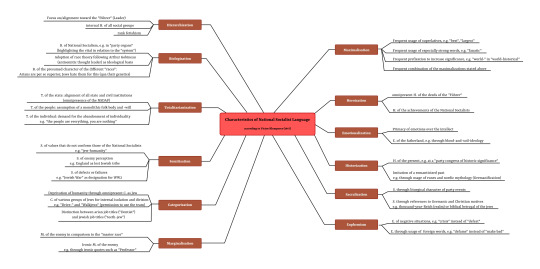
LTI – Lingua Tertii Imperii
"Lingua Tertii Imperii" can help me better understand the Nazis' linguistic invasion. I learned about this book when I was doing a previous project. It mainly introduces how the Third Reich led by Hitler carried out linguistic invasion. The book mentions that on a new people's celebration day, Hitler's birthday, "the people"(Volk) was used very frequently in speeches, just like we use salt when eating, and sprinkle a grain of "people" on everything, the people's festival, the people's group, close to the people, from the people. As well as the word "worldview"(Weltanschauung), the word "viewing" is more formal and vague in German. It means a kind of seeing, in the heart of the viewer, with their emotions involved.
The language of the Nazis also changed the value and usage of words. A niche word became a public word. Because of their constant propaganda, language served their terrible system and became their most powerful and most powerful one. Publicity is also the most secret method of propaganda and deception. These repeated and constantly used languages can be said to be a kind of language pollution. The word "Herorisches" is also frequently mentioned in the language system of the Nazis. In itself, this word should be righteous and pure, but the Nazis continued to whitewash "heroism", making its core hollow and destroying its reputation.
The Nazis firmly believed that they could have eternal vitality. Every speech the Führer made was historical, even if he said the same thing a hundred times, so "historic" was particularly prominent in the language of the Third Reich. Every holiday is historic, even all days. "Superlative" is also the most commonly used language form in this party. It is frequently used by orators and agitators and is essentially a form of advertising. When the officer gave the order, he said "The best weapons in the world, made by the best workers in the world (Welt), are provided to the best warriors in the world, arming them", "The world obeys the leader", every time a game is won Big battle, there is "the greatest battle in the history of the world".
What these languages pursue is fanaticism. The word "eternal" (ewig) can be understood as the highest level of Nazism in the language of the Third Reich. When I call something "eternal," we find the path to eternity. Hitler said at the school's celebration ceremony, "What comes after the Third Reich?" Some students may answer "The Fourth Reich", then they will be regarded as unqualified believers. The correct answer must be "The Third Reich is the eternal Germany."
It can be said that the most powerful influence of the Nazis did not come from speeches, leaflets or articles. They relied on common phrases and the most common sentence patterns to subtly influence people's way of thinking, using things that are easiest to absorb and accept. The more naturally these words ring in our minds, the more unconsciously we surrender our thoughts to these words.

In rural China, bold red characters on the wall are the most common form of publicity. You don't know when it appeared or when it changed. These red slogans have always existed on the wall. I think it is a kind of discipline. The "socialist values" that I was required to recite when I was in high school can still be blurted out now. Words like "civilization", "harmony", "freedom", etc. have a positive meaning, but when it is used as a slogan, when it is written all over the streets, it will gradually lose its own meaning. The Chinese caused controversy by writing these slogans on the walls of London. Under freedom it was written "There is no freedom in China". Here are also opposing ideas and different views colliding. When we give meaning to words, it affects us and creates confrontations and contradictions, further invading our thoughts.
0 notes
Text
Sources & Significance 1_1.4 - Gesamtkunstwerk
What is a ‘Gesamtkunstwerk’? Gesamtkunstwerk is a term coined by German philosopher Karl Friedrich Trahndorff in 1827, it was popularised by German composer Richard Wagner in the mid-19th century. It literally translates to ‘Whole Artwork’ and represents a piece of art that combines a multitude of artistic disciplines into a perfect whole. While this term was largely applied to architecture and particularly theatre, I personally find the term to be needlessly pretentious as most works of art use a combination of multiple disciplines and techniques, I do believe that Video Games are the purest form of this concept. Combining 2D/3D Visual Art, Audio design/ Production, Architecture, Anthropology, Animation, Business, Cinematography, Communication, Psychology, Engineering, Creative Writing, Economics, History, Management, Mathematics, etc.
A more interesting interpretation of the term Gesamtkunstwerk is “an artistic environment or performance in which spectators are expertly maneuvered into dumbfounded passivity by a sinister and powerful creative force. It is often mistaken for a hazy mixture of art forms that intoxicates those who gather in its presence” - Ivan Phillips (2013). While I would argue against the term “sinister” I assume it is simply flowery language attempting to get across the ‘otherworldly’ nature of effective art, as well as the term “passivity” as I believe ‘acceptance’ or ‘suspension of disbelief’ is more fitting and less exclusionary to other forms of art. Beyond that I think this description is very interesting and gets at the heart of what takes Gesamtkunstwerk beyond simply a combination of art forms. It is deliberate, skillful and employs a variety of approaches to almost cast a spell on the viewer to pull them into the work. Again this is incredibly applicable to the genre of interactive media, and also why I would argue the word passivity.
This brings us to the argument of Medium specificity. The inherent differences in materialities and properties between particular forms of media. For example: a novel uses words to illustrate it’s world while a film version of that same novel would express this through imagery. Both are visual mediums. However in the lense of Interactive Media the lines become blurred. While it is a visual medium at first glance far more related to film than the written word, games like Resident Evil for example let you find notes that often contain important clues that allow you to progress as well as general information that fills in the world of the setting. So does Medium specificity still apply? I believe less so. In particular not when applied to interactive media forms. We must draw on all forms of art to deliver an experience which has interactivity at the heart of it, the user is an active participant so the spirit of the art is more important than the specifics of the individual medium. In the words of Krauss (2000: 10) - “specificity not of materials but of ‘the essence of art itself’”, Lev Manovich takes this even further in his article ‘Post-Media Aesthetics (2000) - “Various cultural and technological developments have together rendered meaningless one of the key concepts of modern art - that of a medium”. In this argument I believe the medium as a form of expression is replaced by the medium more as a form of categorisation. However he also speaks of the digital medium in his (2001: 208) article ‘The Language of New Media’ - “Regardless of how often we repeat in public that the modernist notion of medium specificity (“every medium should develop it’s own unique language”) is obsolete, we do expect computer narratives to showcase new aesthetic possibilities which did not exist before digital computers. In short, we want them to be new media specific”. This raises an interesting other side to the argument, that while we take from multiple mediums to develop the language of our work, we are pushed to define medium specific processes and creative culture. Similar views are reflected in the general understanding of Computer as a “metamedium”. Alan Kay posits in his (1984, 52) book ‘Computer Software’: “[a computer] is a medium that can dynamically simulate the details of any other medium, including media that cannot exist physically. It is not a tool, though it can act like many tools. It is the first metamedium, and as such it has degrees of freedom for representation and expression never before encountered and as yet barely investigated”. In another article (2013) ‘Software takes command’ by Lev Manovich he states “The computer metamedium is simultaneously a set of different media and a system for generating new media tools and new types of media. In other words, a computer can be used to create new tools for working with the media types it already provides as well as to develop new not-yet-invented media”. In this sense Video Games can probably be considered the purest form of a ‘Gesamtkunstwerk’ if such a definition is even necessary in the modern age.
0 notes
Text
Speak the World by Exploring Foreign Language Programs in Pune
In the vibrant city of Pune, where diversity is celebrated, mastering foreign languages is an invaluable skill. The Symbiosis Institute of Foreign and Indian Language (SIFIL) stands as a beacon for language enthusiasts, offering a myriad of courses that cater to the growing demand for linguistic proficiency. In this article, we'll delve into the offerings of SIFIL, with a specific focus on foreign language courses, particularly the highly sought-after German language classes in Pune.
Exploring SIFIL's Foreign Language Courses
Diverse Offerings:
SIFIL prides itself on providing a comprehensive array of foreign language courses designed to meet the diverse needs of its students. Whether you are a beginner embarking on a linguistic journey or an advanced learner seeking refinement, SIFIL has courses tailored to various proficiency levels.
Foreign Language Courses Overview:
The institute offers courses in popular languages such as French, Spanish, Japanese, Chinese, and, notably, German. Each course is crafted with a holistic approach, incorporating aspects of grammar, vocabulary, pronunciation, and cultural nuances.
German Language Classes in Pune:
For those specifically interested in German language classes in Pune, SIFIL stands out as a prominent choice. The German courses are structured to facilitate a deep understanding of the language, covering both conversational and written aspects. The curriculum is designed to immerse students in the rich tapestry of German culture, enhancing the learning experience.
Why Choose SIFIL for Foreign Language Learning?
Experienced Faculty:
SIFIL boasts a team of seasoned language experts and educators. The faculty is not only proficient in the languages they teach but is also committed to creating an engaging and supportive learning environment.
Interactive Learning Methodology:
At SIFIL, the emphasis is not solely on theoretical knowledge. The institute adopts an interactive learning methodology, encouraging students to apply their language skills in real-life scenarios. This approach ensures that students not only grasp the language academically but can also communicate effectively in practical situations.
State-of-the-Art Facilities:
To facilitate an optimal learning experience, SIFIL provides state-of-the-art facilities. Modern classrooms, language labs, and multimedia resources are integrated to create an immersive and technology-enhanced learning environment.
Enrolling in German Language Classes at SIFIL
Admission Process:
For individuals aspiring to enroll in German language classes at SIFIL, the admission process is streamlined and accessible. Prospective students can visit the official website to find detailed information about admission requirements, course durations, and fees.
Flexible Schedules:
Recognizing the diverse commitments of its student base, SIFIL offers flexible schedules for its courses. Whether you are a working professional or a student, you can find a course schedule that aligns with your lifestyle.
Community and Networking:
Beyond the classroom, SIFIL fosters a community of language enthusiasts. Networking events, cultural exchanges, and language clubs provide additional opportunities for students to practice their language skills and build connections.
Conclusion SIFIL emerges as a leading institution for individuals eager to explore foreign languages, with a spotlight on sought-after German language classes in Pune. The institute's commitment to excellence, experienced faculty, and interactive learning methodologies make it a prime choice for those looking to unlock the doors to multilingual proficiency. Whether you are drawn to the elegance of French, the rhythm of Spanish, or the precision of German, SIFIL promises a language-learning journey that goes beyond the ordinary, opening doors to new cultures and global opportunities.
0 notes
Text
The History Of Lithography
Lithography is a printing technique that has been used for over two centuries. The process involves printing an image from a flat surface onto paper or other materials. Lithography was a significant innovation in the printing industry, as it allowed for the mass production of high-quality images and text. This article will explore the history of lithography, from its invention to its modern-day use.

The Invention of Lithography
Lithography was invented in 1796 by Alois Senefelder, a German playwright and actor. Senefelder was struggling to produce copies of his plays, which he had written by hand. He experimented with various printing techniques, including engraving and etching, but found them to be too expensive and time-consuming.
One day, while cleaning a stone slab that he had used to write a script, Senefelder noticed that the grease from his writing had created a visible image on the stone. He realized that he could use this process to create printing plates that could be used to mass-produce copies of his plays.
Senefelder's process involved drawing an image onto a smooth stone surface using a greasy substance, such as a mixture of wax, soap, and lampblack. He then treated the stone with a chemical solution that would fix the image onto the stone surface. The stone was then inked and pressed onto a sheet of paper, creating a printed image.
The Advancement of Lithography
Senefelder's invention quickly gained popularity, as it allowed for the mass production of high-quality images and text. However, the early lithography process was time-consuming and required skilled craftsmen to create the printing plates.
In the early 19th century, new advances in lithography made the process more efficient and accessible. One of the most significant innovations was the development of lithographic presses, which allowed for faster and more consistent printing. The introduction of zinc plates also made it easier to create lithographic printing plates.
Lithography became popular in the art world as well, as artists began to use the process to create prints of their artwork. Many famous artists, such as Francisco Goya and Henri de Toulouse-Lautrec, used lithography to create their prints.
Lithography also became a popular method for printing maps, books, and other materials. The process allowed for the mass-production of high-quality materials, making it an essential tool for businesses and governments.
The Rise of Color Lithography
In the mid-19th century, lithography underwent another significant advancement with the introduction of color printing. The process of color lithography involved using multiple printing plates, each with a different color ink, to create a full-color image.
Color lithography was a significant innovation in the printing industry, as it allowed for the creation of vivid, colorful images. The process was particularly popular in the advertising industry, as companies began to use color lithography to create eye-catching posters and advertisements.
The Modern Use of Lithography
Today, lithography is still a popular printing technique, although it has been largely replaced by digital printing in many applications. However, lithography is still used in many industries, including art, publishing, and packaging.
In the art world, lithography is still used to create prints of artwork. Many artists appreciate the unique qualities of lithography, such as the ability to create bold, textured images. Lithography is also used to create limited edition prints, which are highly valued by collectors.
In the publishing industry, lithography is still used to print books, particularly high-quality art books. Lithography allows for the creation of high-quality images and text, making it an essential tool for producing high-end publications.
Lithography is also used in the packaging industry, particularly for the printing of labels and packaging materials. Lithography allows for the creation of highly detailed and vibrant images, making it an ideal method for creating eye-catching packaging.
In recent years, digital printing has become increasingly popular, and many industries have shifted away from lithography. However, lithography still offers unique benefits, such as the ability to print on a wide range of materials and create textured images.
Conclusion
Lithography has a rich history that spans over two centuries. From its invention by Alois Senefelder in 1796 to its modern-day use in the art, publishing, and packaging industries, lithography has played a significant role in the printing industry.
Senefelder's invention revolutionized the printing industry, allowing for the mass production of high-quality images and text. Advances in lithography technology, such as the development of lithographic presses and color printing, further expanded the capabilities of the process.
Today, lithography is still used in many industries, although it has been largely replaced by digital printing in some applications. However, lithography continues to offer unique benefits, making it an essential tool for creating high-quality prints and packaging materials.
#lithograph#nostalgia#pacasso#fine art#artwork#historical art#collectible#collectables#collection#collectibles#history#nostolgia#art print#art collecting/sales#art collectors#art collection#antiques#antique#vintage style#vintage#vintage art#1950s vintage#1950s style#1950s art#pablo picasso#lithography#enlightenment#abstract art#art deco#art
1 note
·
View note
Text
Lesley-Ann Jones Is Untrustworthy
So I’ve seen some people in the fandom reading and citing Lesley-Ann Jones’ biography The Search For John Lennon recently and to be honest it’s concerning to me. Lesley Ann Jones has proved in the past to be an extremely untrustworthy source for info about the people she writes about. I understand that it’s exciting to have a book about John that’s not written by the typical “Lennon biographer” type (aka an ageing straight man) and for said book to also promise to shed light and focus on his bisexuality but, if we’re going to analyse John respectfully and accurately, it’s important to identify sources that are biased and untrustworthy, even if they’re technically within our favour. Especially when it relates to his queerness. And seeing as LAJ doesn’t have the best record when it comes to writing about rockstars’ sexualities in a respectful manner, it’s best to treat her words with caution.
Info about exactly how she’s a bad source is under the cut
Firstly, it's key to talk about LAJ's journalistic background when discussing what sort of writer she is: she's worked for papers such as The Sun, The Daily Mail, and The Mail On Sunday. Essentially, the bulk of her work has been for tabloids and traditionally the writing style for those kinds of publications place an emphasis on sensationalism and gossip. Now obviously that doesn’t discredit her work immediately, authors are usually able to write in more than one style so it doesn’t necessarily mean the tabloid style is going to carry over to her biographies; but it’s good to keep in mind when discussing and analysing the legitimacy of the narratives she creates and the stories she recounts in her work.
LAJ has received criticism in the past, particularly from the queen fandom of often overexaggerating, or just straight presenting false information in her bios about Freddie Mercury. She is the champion of the claim that Freddie was bisexual and not gay. Her evidence for this is over-exaggerating and (seemingly intentionally) misinterpreting the nature of the relationship between Freddie and his friend, Barbara Valentin. LAJ claimed that the two had a relationship and even lived together:
“Barbara was very open with me about the sexual relationship she had with Freddie.”
(x)

(x)
However, no-one in Freddie’s life has ever corroborated that Freddie and Barbara were anything but friends. As for the claim they lived together, according to Peter Freestone, an extremely close friend of Freddie’s:
In the event, Freddie never actually lived there although Barbara fulfilled a huge role in Freddie’s life at that time... Freddie became very disillusioned when with more and more frequency articles were appearing in the German press’s gossip columns... about the relationship between him and Barbara... After one article claiming to have knowledge of him and Barbara getting married, Freddie... concluded that it could only be Barbara who was providing the information.
(x)
This exaggeration of their relationship and the insistence LAJ has on presenting Freddie as bi because of it has attracted criticism from queen fans for obvious reasons. For one, it’s borderline homophobic to essentially lie about a gay man having a relationship with a woman while downplaying his relationships with men. No, she’s not portraying him as a straight man, however it’s still erasure of the specific struggles Freddie would’ve faced being a gay man in his time, therefore those who want to analyse him would be missing some of the picture when trying to understand him and his life
LAJ’s research methods are also... questionable. This is a post from Crystal Taylor (one of Roger Taylor’s roadies) about her methods for her David Bowie bio which, if to be believed is particularly concerning.
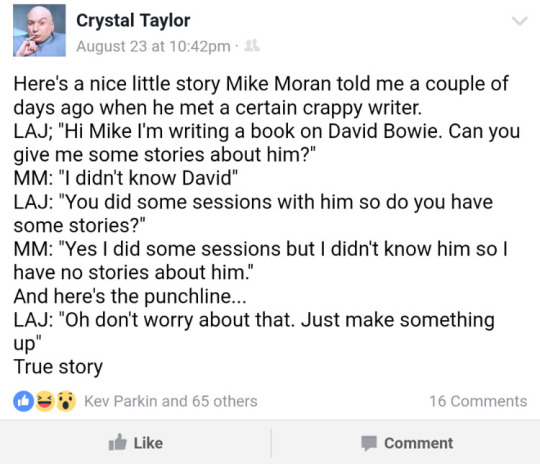
(x)
LAJ is also known to greatly exaggerate her own relationships with her subjects. She often claims to have been friends with the people she writes bios about (coincidently the people she does this with are dead.) Back in the day she would meet with artists while on tour so the idea is convincing enough. However besides her word there’s nothing to suggest that she had close friendships with Freddie or Bowie, two people she claimed to be good friends with. There’s also this comment from Brian May which actually goes against the idea that she was close with Freddie:

(x)
So with all of this in mind, let’s look at the quote from The Search For John Lennon that’s been circulating around Beatles tumblr:
That Bowie worshipped Lennon is no secret. He'd banged on about it often enough. The ex-Beatle had gone to his hedonism. They'd met in Los Angeles, during John's Lost Weekend. I lunched from time to time with David in New York while working there as a music journalist, before he married Iman. He lent me his house in Mustique, to write the first draft of my first biography on Freddie Mercury.
The crazy pair went out to play, according to David, when John was on yet another break from May and far away from Yoko. They genderbender-ed about, John indulging again that 'inner fag' of his. What larks.
They later 'hooked up': 'There was a whore in the middle, and it wasn't either of us,' David smirked. 'At some point in proceedings, she left. I think it was a she. Not that we minded.' By the time they made it back to New York, the ambisextrous pair were 'lifelong friends'.
I’m suspicious of this story for several reasons but first I want to make it clear that none of them have to do with John having sex with men or being bisexual. I’m a very firm believer of John’s bisexuality (my username is literally queerlennon lmao) but once again I think it’s good to examine the legitimacy of sources, even when they favour our position.
Firstly, LAJ’s source for this story is the claim that David told her, which considering I can’t find any info about them being friends besides her word, combined with the fact that she’s lied about having close relationships in the past raises a lot of flags.
But even if we assume LAJ isn’t lying and did know Bowie, the quote is still suspect, particularly the line “John was on yet another break from May and far away from Yoko.” According to May in her book Loving John, her and John had only one break from their relationship (the phrase “yet another break” implies multiple) that lasted a week, and for the entirety of that week, John was with Yoko. (x)
Finally, the language LAJ uses to describe John and David’s sexualities not only puts me on edge but very much makes me question her intention. Phrases like “the genderbender-ed about,” “indulged his ‘inner fag,’” and “ambisextrous,” all come across to me as fetishisation. Bisexuality is already very highly fetishised and sexualised and LAJ is most definitely not concerned with deviating from that representation. That phrasing combined with the way she also discusses Freddie’s sexuality, where she’s alleged highly sexualised claims about him having threesomes:
And quite often that involved other people as well. Other men, other women. There would be a number of them in the bedroom at any given time. In fact they were raided by the police once and the police stormed in and they found more people than they were expecting to find in the bed that morning.
(x)
— leads me to believe that LAJ is an author less concerned with exploring John’s sexuality as apart of his life, something that made him who he was, and more concerned with including details about “bisexual threesomes” as shock value, as a sensational point she can use to to promote her book in press tours and interviews. Like a tabloid writer. And this sort disrespect representation of John’s queerness, imo isn’t that much better than the biographers who dismiss or underplay it. I totally understand that for a lot of us, finding out new info about John’s queer identity is exciting, especially for those of us who are queer and identify with a lot with John for that reason, myself included. But we shouldn’t be giving credence and legitimacy to someone who firstly, isn’t trustworthy and secondly who’s reason for talking about it is gross and exploitative at best and biphobic at worst.
tl;dr, LAJ is an incredibly untrustworthy source of info and in her own over exaggerations, treats discussions of queerness in an extremely problematic and exploitive way so please take anything you read from her with a massive grain of salt.
#john lennon#the beatles#freddie mercury#queen#david bowie#beatles analysis#lesley ann jones#shut up fable#classic rock#biographies/memoirs#fable’s analysis
124 notes
·
View notes
Text
On Doing Your Own Research in News and C-ent in General
Recently, a user on the bird app posted a PR-like guideline for the international audience to use when discussing ZZH's situation:
Here. It's pretty well written and keeps the points simple when talking about ZZH's situation. The user also cautions not to come out and attack anyone or start something over it, these are just points for rationale/short clarifications and conversations. It's currently available in English, Vietnamese, Russian, Portuguese, Korean, German, and Thai (probably more later).
I see the phrase "doing your/my own research" flying around a lot, and I realize that many people don't know how to do that. News has become increasingly harder to consume because many people are not trained or do not have time to consume media critically, and then it's easy to be fooled by some bad players. From someone who has extensive background in the research sciences, I would like to share some tips and thoughts on media & the Chinese entertainment industry (c-ent).

Table of Contents: How to keep yourself from getting fooled by controversial news
1. Follow the Money - western and c-ent
2. Cross Ref Facts
3. Verify Sources - who am I?
4. Read Primary Articles
5. The Case of a Certain Celebrity (ZZH)
Below the cut to keep reading:
1. Follow the Money
Every news source is invested in getting user views to generate income. Understanding the corporate interests that are invested in each news source will let you understand the limits of that source's perspective. For example, I often read The Washington Post, a renowned newspaper. To publish in this paper requires some form of notoriety/editing/fact checking, so I can rely on that. However, it is also owned by Amazon, so if it publishes things involved with Amazon or Amazon competitors, I will have to double check with some other source, see other perspectives. Why? Because it might have a vested interest in keeping Amazon happy, which might mean a bias towards it, etc.
-What about smaller news sources that don't have a clear money interest?
If we look only at social media accounts for news, it is much harder to see what their sources are and what motivates them. So for these, I would say simply make a note in your mind on what's happening, but don't go further than that. There's really no way for you to confirm until other larger outlets / the authorities do their own investigations.
Note on C-ent from someone who doesn't speak Mandarin:
Sadly, I have to rely on secondary accounts of news to see what's happening in c-ent. Even when topics on weibo/chinese media are posted with original sources, the machine translation/google translations often don't make too much sense? If you've tried this before, you'll know what I mean. You can still find out what source that news is coming from though.
Is it coming from the Chinese government? Yes? It's probably biased to keep the government's power absolute. Note it.
Or a melon/gossip account that gets paid to make up rumors? Yes? It's probably trying just to get views and $$$. Ignore.
Or is it from a solo/anti fan who is invested in spreading negative media? Yes? Ignore.
So in this case, I would use the best tactic: wait and see - watch many accounts and see what they say before you decide or say anything yourself. Ask questions, ask clarifications. DO NOT make judgments.
2. Cross referencing facts
If you see a particularly "hot" or scandalous topic flying around, I recommend checking other channels to see if it's also been reported on. Unfortunately, news nowadays happens very quickly with very little background checking, so the news outlets may just be copying each other. Normally, I'd check CNN/WaPo/New York Times/MSNBC/etc to see how it's reported. Then if you want to check another, more conservative perspective, you can check Fox News (I suppose), but I'd be very careful since they're not known for their fact-checking prowess.
C-ent note: since I don't speak Mandarin, I rely on a bunch of different sources on Twitter/Tumblr to translate and link news. This in itself is flawed because I am seeing it through the translators' eyes, so there's bound to be bias. However, it's still valuable because you can compare different accounts of what happened.
Did "A" translate this article to mean this?
Did "B" also say the same? If it's different, why? Are the two accounts antis or solos? CPFs? Neutral? If the news is translated the same, it's more likely to be real - but not confirmed yet so hold your horses.
All these questions are useful when consuming media via a third party. Again, if the news is too fresh like it's only been 1-3 days, it's probably highly biased. Only time will tell what really happened.
3. Verifying Sources
Who is writing the piece of media/news that you are reading? Is it from a professional source? From a well-known university, newspaper, journalist, or verified eyewitness/video? From a nonprofit organization?
Or is it from a random tumblr blog like mine? Haha, take what I say with a grain of salt as well because you don't know my identity, my vested interests, or anything about me. I can say that I am an older Asian American with progressive biases whose education was mostly in the biochemical sciences + digital art media. But there's no proof, and you don't have to believe me if you don't want to. I've just been trained for a long time to think critically in this way.
All your answers to these questions will tell you how much you can rely on that piece of media.
4. Read Primary Articles
As much as you can, read a *primary* article. What is primary? It means from the ORIGINAL source, the author. It could mean an actual statement from the victim, a verified eyewitness, or from government investigations. In both science and other news media, it is the most reliable thing to read the primary article. This is because I can read exactly what the author is saying and look at their sources directly. I can judge three things:
Tone - VERY important. if the article is written with inflammatory language like extreme words (righteous, traitor, treason, shame, betray, always, never, completely, "national dignity", notorious, infamous), then I already know to expect this article is highly biased and/or just parroting other accounts. It's trying to get a rise out of you, and trying to get you to share the article with more people + generate views and $$$.
Sources referenced + Evidence used - If the source is referencing another source, which references another source... etc, it's probably not reliable (and not a primary article). If the only evidence it uses is a photo, then... what? Am I to assume all the knowledge they provide is the real context for the photo? No. This primary article, then, is assumption-heavy.
Author's identity and biases - What does the author have to gain? Who are they? Is trashing a certain person/event beneficial to them in some way? For clicks/views?
5. An Example of a Certain Celebrity
For example, let's say a random twitter/weibo account starting talking about a certain celebrity visiting a supposedly controversial area-of-interest in a country whose history is fraught with controversy. They post a photo that holds almost no context and is not instantly recognizable for most people. The photo contains a person posing in front of cherry blossom trees, a Japanese-style building, and maybe some foreign signs and other tourists.
With no knowledge of this area, the average viewer may decide to trust what this random twitter/weibo user says. However, we know how to read these bits of news now---
Let's go through the steps:
1. Follow the money
Who posted this? We don't know? Let's ask, is it possible this is from a melon account, hired "reporter", with no prior professional standing and integrity in news media? Yes? Then I can be careful in reading their news. What if I don't know the language? Then wait. It will be translated by multiple people no doubt, compare those translations. If they same the same thing, then you can continue reading what they wrote. Keep a level-headed mind and slow down.
2/3. Cross reference the facts & verify sources
The random twitter/weibo user references the Chinese equivalent of wikipedia. I know that wikipedia can be edited by anyone, and thus contain misinformation, it's not the best source to cite. So this piece of evidence is already iffy. The twitter/weibo user then references national events from the historical record as part of their argument that the celebrity did something wrong. This is usually known and kept as fact in most ppl's minds. However, it's not really evidence of any wrong-doing because it's merely referencing history that is not directly related to the celebrity. Then I would think, wait. Why would this user try to rile me up and get me angry from older history? Ah, so I would share this news, get them views, get them clicks and likes, and make them $$$. Not only that, I would think, maybe they have an agenda against this certain celebrity? Already untrustworthy news source.
4. Tone/Identity/Bias
The tone of this news seems vague on purpose. Many accounts retweeted/relayed the information that he visited some shrine with some background and only gave a few pictures of a supposed remote area most people aren't familiar with. Why not use direct words? Why leave room for implication if it was really what happened? So that people can fill in the blanks with their own imaginations and assumptions? So they can feel righteous indignation that this celebrity is somehow unpatriotic and "offended the feelings of the nation"? Ah, so this news was written this way intentionally - to rile people up.
Identity and bias are harder to discern because I wouldn't know mandarin, I'd rely on translators to do that work. Then, because I would wait to see and judge the real events, it would come out that this account and many others were paid/hired accounts to spread misinformation and gain $$$ via the downfall of that celebrity.
It was a grand campaign of misinformation and disinformation to collectively shut down a competitor in the industry, to make the gossip accounts tons of $$$, and to flex on everyone that they can control the national consciousness with a few well-placed, well-timed, edited, misinformed photos and articles.
----------------
Quick note on feeling indignation about JP/CN history: I want to note that it's valid to feel offended and hurt about the history between Japan and China depending on who you are. It's normal, feel it. But don't let others take advantage of you and your feelings. They have their own agendas in making you feel this way. Wouldn't you be tired of being constantly called upon to feel outrage? I would.
-----------------
This got longer than I expected, but I hope it helps you when you consume your next bit of controversial news. Remember to slow down, wait, and see.
14 notes
·
View notes
Note
Hi there, I really liked what you had to say about the upcoming election. I was wondering if you have published any articles recently in regards to that? I know you said you were a historian.
Aha, thank you so much, this is very flattering. Alas (?), the book that I have just published is about the crusades, as I am a medieval historian by training. However, one of my main research interests is the role of the “imagined medieval” in modern culture, I have written a book chapter about the role of the crusades in post-9/11 political and cultural rhetoric, and I am developing a research project that examines the current crisis of public history through a medievalist perspective. That, however, is still in draft stages.
That said, I absolutely DO have a mini reading list for you (and a lecture to go with it, because as noted, I am an academic and this is how we function!) The topic of today’s class is “Why Accelerationist Ideology Is And Always Has Been Horrifically Racist and Genocidal Throughout History, and White Americans Only Like It Because They Don’t Live In Countries Where It Was Done (By America).” Not very snappy, but there you have it.
The reading list, to start off, is:
The Cold War: A World History by Odd Arne Westad
The Shock Doctrine: The Rise of Disaster Capitalism by Naomi Klein
The Silk Roads: A New History of the World by Peter Frankopan
Stamped from the Beginning: The Definitive History of Racist Ideas in America by Ibram X. Kendi
Drift: The Unmooring of American Military Power by Rachel Maddow
The Bridge Betrayed: Religion and Genocide in Bosnia by Michael Sells
These are all hefty books (though the Maddow and Sells books are shorter) but they’re accessible and written for the layperson, and we always have time to educate ourselves. Why are they relevant to the 2020 election, you might ask?
First: the Cold War book lays out in great, GREAT detail the consequences of a global world order absolutely gripped by a competing standoff of ideologies (American capitalism vs. Soviet socialism) and how these two forces gulped up the politics of the rest of the world, destroyed numerous satellite states, and tried to rebuild them from the ashes into new ideological utopias -- precisely what a lot of people are suggesting now with the ridiculous “just burn everything down and it will magically fix itself!” theory that is somehow presented as the Moral Alternative to voting for Biden/Harris. You know what this caused during the Cold War? Yep. Human suffering on a massive scale, and absolutely zero utopian perfect states, whether capitalist or socialist. It also makes the extremely salient point that in the 1930s, German leftists and liberal democrats were infighting among themselves as to who was Less Morally Pure, and couldn’t agree on a candidate or a moral imperative to oppose the other guy, and figured that their flawed liberal idealists were “just as bad” as said other guy. Was that guy’s name Adolf Hitler? Why yes. Yes it was. Is there a lesson here for us? Who can say. Seems hard to figure.
Leaving aside the tragedy and pointlessness of the Korean and Vietnam Wars, both fought as proxy battlefields between Americans and Soviets, let’s consider the Great Leap Forward, in China (1958-1962) under Chairman Mao Zhedong. The idea was to dismantle traditionalist Confucian Chinese society and rebuild it as a modern socialist state, which was the goal of a lot of twentieth-century old-school socialist/Marxist “people’s republics.” Mao took this exact “burn conservative society down and rebuild it according to Enlightened Leftist Principles” approach and it was... a disaster. A total and epic disaster that caused both short and long-term suffering to the Chinese people and, wouldn’t you know it, did not result in a utopian Chinese state. This is also the reason you cannot say anything complimentary about Fidel Castro, especially if you want to win Florida, no matter how “good” you think his socialist principles were in the abstract, because: Cubans and Cuban-Americans fuggin’ hated the guy. You know why? Because he also destroyed their lives.
Obviously, there is a ton of distance between old-school Communism in the 20th century and 21st-century modern democratic socialism such as that run in Norway (and the Scandinavian countries in general), no matter if your racist uncle on Facebook insists on conflating the two and howling about the Red Menace like it’s still 1962. But the point is that radical leftist accelerationist theory hasn’t changed from 1962 (or frankly, from Karl Marx) either. It still figures that by some miraculous principle, the entrenched systems and ideologies will either just disappear or be “torn down,” the Peasants will Rise Up and Overthrow the Aristocracy, and something something socialist utopia. Except that was tried multiple times in the 20th century and it always failed. More than that, even if it was supposedly “leftist,” it inflicted just as much suffering on its own people as fascist right-wing dictatorships. Americans have always been infused with the triumphalist confidence that they “won” the Cold War because socialism was bad, and it was the inherent flaws in socialism as a world order that doomed it to defeat, unlike rah-rah Red White and Blue American Capitalism. So capitalism, ignoring its own fatal flaws, went hog-wild in the 80s and 90s, establishing Reaganite deregulation as the core and unimpeachable tenet of the market, and we’re all living in the increasing wreckage of that economic system now. Obviously the right wing uses “socialism” as a bugaboo to scare us that Things Could Be Worse, but I haven’t seen the faintest trace of historical context or awareness from the particularly deluded breed of hard leftists who still cling onto the magical theory that a Perfect People’s Uprising Will Fix Everything.
On that note, let’s move to Naomi Klein. The Shock Doctrine lays out in similar excruciating detail how the U.S. systematically destroyed the economic systems of countries particularly in Asia and Latin America (and the entire shameful history of Uncle Sam in Latin America should be required reading for EVERYONE) and sold them a bill of goods about “free market economics” in the Keynesian model. Guess what resulted from this attempt to destroy entrenched societies overnight and rebuild them in the name of Ideology? If you guessed “massive human suffering and ongoing generational devastation and dysfunction” you’d be right again! This was accompanied with constant political interference from the CIA and the State Department to support right-wing dictators and military takeovers in a way that have left the politics and institutions of Central America in permanently broken disarray, because it turns out it’s a lot easier to keep exploiting those brown people in governmental systems that don’t allow dissent or democracy, no matter the exalted principles you like to preach about Freedom and Liberty. The U.S. likes to act as if the Central American refugee crisis is this unwarranted invasion of these dirty immigrants, as if it didn’t play a DIRECT AND LONG LASTING EFFECT in destroying the infrastructure of these countries to the point where they’ve become incapable of functioning as healthy democracies. If you think “banana republic” is the name of an upscale clothing store, I beg you, research the history of that term.
This hasn’t even gotten to the absolutely horrible history of Africa’s treatment at the hands of white Europeans (see the Kendi book for obvious anti-racism education and also how those racist ideas are directly built into the ideological infrastructure of America). Somehow white leftists, while professing to be allies of Black Lives Matter and proclaiming themselves Woke, have managed to overlook this, and I don’t know how??? (Answer: it’s racism Jan.) First it was the transatlantic slave trade and the large-scale kidnapping, sale, and chattel bondage of generations of people. Then it was 19th-century colonialism and imperialism, where Europe thought it could “civilize” the “Dark Continent” and rebuild it to an “enlightened standard.” This was not a right-wing project; this was solidly mainstream and it was enthusiastically advocated by many liberals and intellectuals who busily composed an entire academic and “scientific” literature to support it. Did the European wholescale destruction of traditional societies in an attempt to build a Perfect Ideological Utopia result in... massive human suffering, by any chance? Leopold II of Belgium might have something to say about that. Then when an overstretched Europe was finally forced out of its overseas colonies in the aftermath of World War II, guess what resulted? Did African society spring from the ashes and remake itself in a perfect image? Nope! It became subject to decades-long civil wars and bloody military dictators because its infrastructure had been so crippled (very deliberately so) by its departing colonialist overlords that it likewise had no sustainable model for development. It turns out when you break things out of the idea that they’ll magically fix themselves, they just stay broken and they get worse. Now we once more have the West acting like Africa is a hotbed of Primitives while ignoring its own role in destroying it (and the situation in the Middle East, but that’s a whole OTHER can of worms! So many cans! So many!)
The Peter Frankopan book is an excellent exploration into the flourishing medieval trade networks across the East, the function of the Silk Road in bringing culture and commodities across the known world, and how Europe’s intervention and eventual ascendancy was marked by profound violence, the destruction of these networks, and the outright pillage of non-white people and riches. Which we know, but... read it. Europe and its heir (America) started the crusades, colonialism, imperialism, two world wars, and other conflicts that always contained a virulent aspect of spreading Ideology and getting people to Believe The Right Thing. These cumulative conflicts have devastated the planet repeatedly and we are still feeling their effects right up to this minute. They were all connected to Establishing Supreme Ideology and Supreme Whiteness (and Supreme Christianity). I’m detecting a pattern. The Rachel Maddow book explores how from the 1980s onward, America went absolutely hog-wild with the military/military ideology as a central way to solve its problems, which was tied to the Cold War, capitalism, and extreme individualism. All of which are tied to our current mess today.
Obviously, the most extreme examples of putting ideology above people result in outright holocausts, which is why you should read the Michael Sells book about Bosnia. Everyone knows about the WWII Holocaust of the Jews (and we have already seen how that is busily being denied along with the return of anti-Semitism, which never goes away), but the Bosnian holocaust was happening while most of us were alive. The West deliberately ignored it, because it was framed as the “last crusade” against Muslims in Europe and they needed to be removed in order to create a Pure Christian Europe; hence the Bosniaks were apparently an acceptable sacrifice in achieving this. I have some words on my tongue, I think they start with “massive human suffering,” and how that is constantly what results when an existing society, no matter how flawed, is attacked by ideological zealots who see huge amounts of death as an acceptable price to pay for their brave new world, as long as it’s not theirs (and sometimes even when it is). In fact, the accelerationist theory of social change is so profoundly racial and genocidal (and is indeed being used in exactly that way by the neo-Nazis and white paramilitary elements today) that it’s even more shocking to see supposedly progressive and moral people advocating so enthusiastically for it. It is a white supremacist Nazi wet dream of an ideology in which all the “flawed” people just vanish (spoiler alert, they don’t vanish, they are brutally murdered or allowed to die from deliberate and arrogant negligence) and the Aryans cavort in paradise. Just replacing that with some socialist jargon buzzwords doesn’t change the underlying framework.
And this is STILL NOT GETTING to America’s own history, and you know, the fact that this continent was occupied when white settlers arrived, declared it “terra nulla” or “empty land,” and set about slaughtering the existing advanced civilizations and their people in the name of! You guessed it! SUPERIOR IDEOLOGY! Funnily enough, destroying the Native Americans “for their own good” didn’t result in utopia for them. It resulted in.... yeah, I think we get it by now, but just in case, one more time: MASSIVE HUMAN SUFFERING.
Tl;dr: The accelerationist theory of social change (just destroy everything and it will magically rebuild according to our preferred ideology) is a racist and genocidal fantasy of orgiastic destruction that has caused untold damage throughout history. White Americans whether on the right or left are fond of it, because they have never lived in a country where this has been repeatedly and horribly done to them (often by America itself) and which has cost uncountable Black, brown, Muslim, Jewish, Latin American, Native American, etc lives. The deliberate or deliberately negligent destruction of society does not lead to regeneration. It leads to long-term and unfixable damage, and the people who profit the most from deliberate disaster are the capitalist corporate overlords that the left professes to hate. This country is a racist garbage fire and nobody denies that it needs to change or die, but buying into this theory about how you should just stand back and let it burn/obstruct efforts to work within the system and mitigate the damage IS BULLSHIT and RESULTS IN MASSIVE HUMAN SUFFERING AND DEATH. Which, so far as I know, wasn’t supposed to be a progressive value, but hey, I could be mistaken.
Learn some history. Wear a mask.
Don’t be a whiny pissbaby that makes the rest of us die.
Vote Joe Biden and Kamala Harris 2020.
116 notes
·
View notes